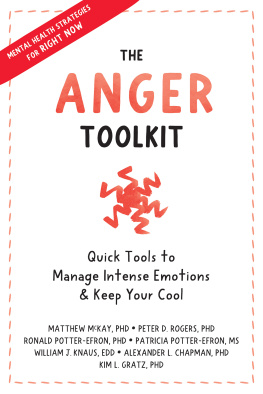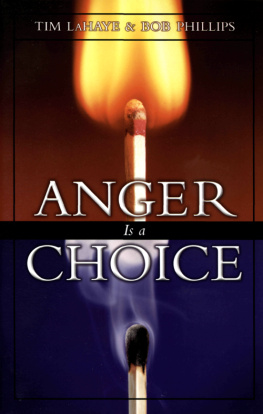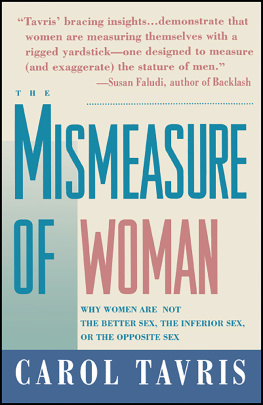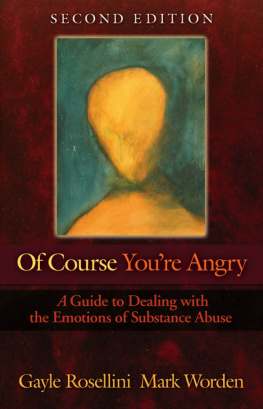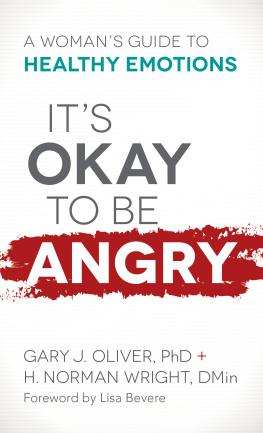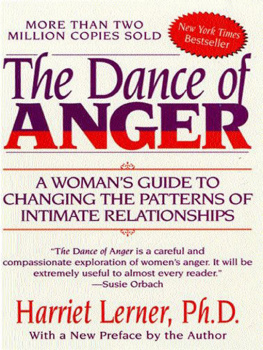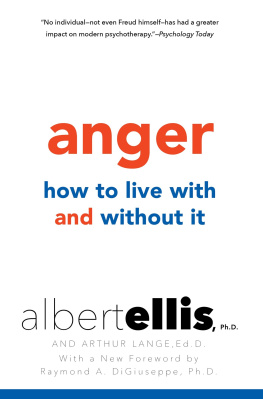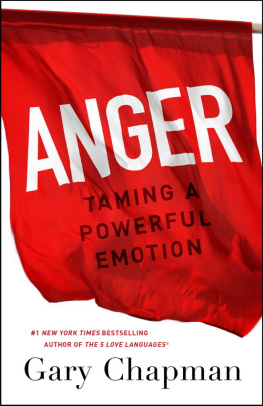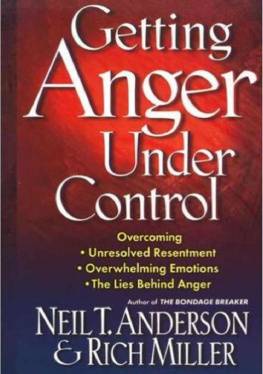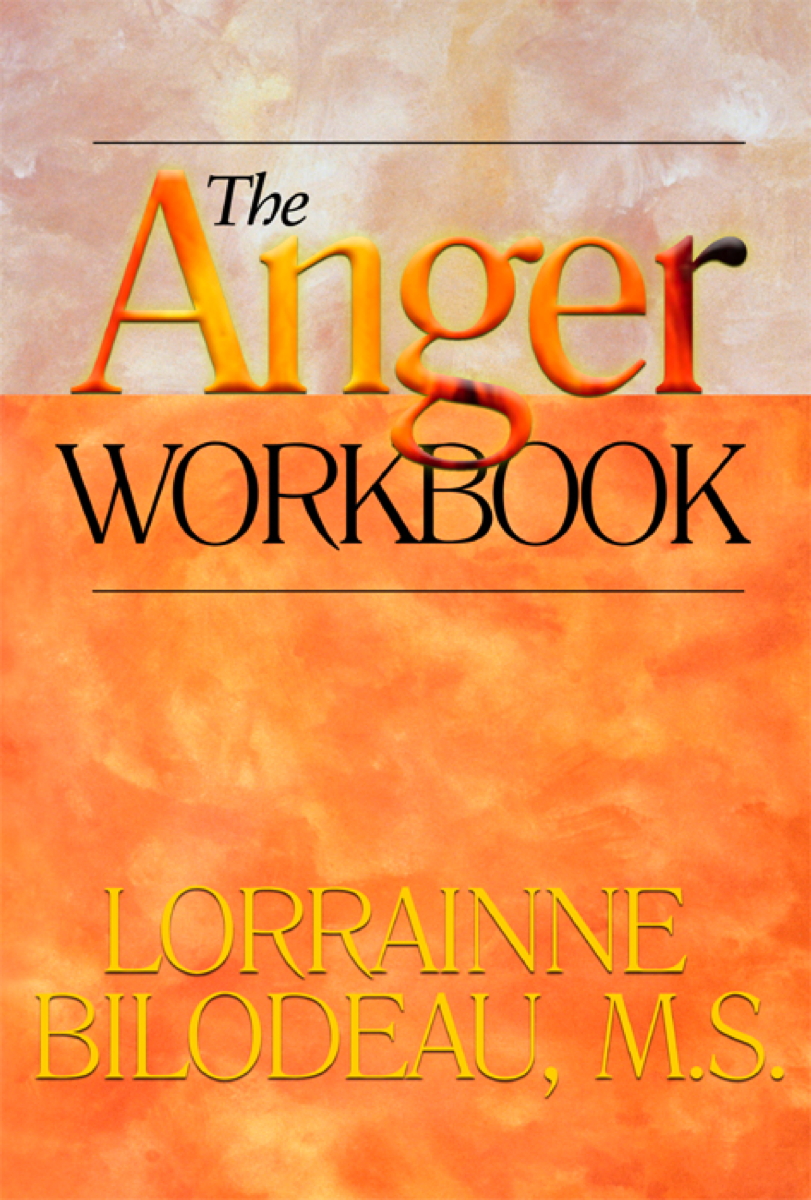Lorrainne Bilodeau,M.S.

Hazelden Publishing
Center City, Minnesota 55012-0176
800-328-9000
hazelden.org/bookstore
1992 by Lorraine Bilodeau. All rights reserved. First published
by Hazelden Foundation 1994 (originally published by CompCare
Publishers 1992). Printed in the United States of America. No
portion of this publication may be reproduced in any manner
without the written permission of the publisher.
ISBN 13: 978-1-56838-054-4
Ebook ISBN: 978-1-61649-143-7
To Mike and Elaine, two friends who were the victims of anger
gone awry.

CONTENTS

CHAPTER ONE
Investigating Personal Attitudes about Anger
CHAPTER TWO
Taking a New Perspective on Anger
CHAPTER THREE
Acknowledging the Complexities of Anger
CHAPTER FOUR
Understanding How Anger Goes Awry
CHAPTER FIVE
Changing Your Experience of Anger
CHAPTER SIX
Responding to Another Persons Anger
This guide is not meant to supplant professional counseling or therapy. If you have destructive thoughts about yourself or someone else, seek professional advice.


Authors Note
The other evening I was sitting with some friends when the topic turned to self-help books. As I expounded rather negatively on the subject, I noticed that my friends were staring at me with puzzled, curious looks on their faces. The light bulb went on, and I blurted out, God forgive me! I have written a self-help book.
Well, thats the truthalthough I do need to warn you: it is an informational manual. You will not find soothing phrases that seem immediately to elevate your mood. You wont find easy answers. And you wont find a whole new you. You will find serious information that explains anger and its uses. You will find a new perspective that, along with a great deal of effort and honesty in working the exercises, will help you change the way you experience and use anger.
There are many people I would like to blame for this overwhelming endeavor. Instead I will do the polite, socially acceptable thing and say thanks to the following:
Ray Matheson, who in 1982 asked me to do a workshop for professionals entitled, Working with the Angry Client. It was the first time I had to present my ideas about anger in an orderly, understandable fashion. I never suspected what would emerge from that first workshop.
Ed Kavanaugh, Mindy Burgin-Debyshire, and Phyllis T. McCafferty, who all took a risk to facilitate the Encountering Anger Clinic, which put the theories of this manual to use.
Dan Scott, Susie Sheppard, Eric Van Quill, and Mary Netsley (the counselors at Richmond Aftercare), who not only put up with me, but supported and laughed with me through my periods of anxiety, elation, and irritability.
Ruthy Kossove, who went out of her way to supply an essential piece of reference material.
And special thanks to Carole Sutton, who said, Write a manual. Its easier than a book. (I really think its the last time shell utter those words.) Her kindness, encouragement, and laughter kept me going.
About Hazelden Publishing
As part of the Hazelden Betty Ford Foundation, Hazelden Publishing offers both cutting-edge educational resources and inspirational books. Our print and digital works help guide individuals in treatment and recovery, and their loved ones. Professionals who work to prevent and treat addiction also turn to Hazelden Publishing for evidence-based curricula, digital content solutions, and videos for use in schools, treatment programs, correctional programs, and electronic health records systems. We also offer training for implementation of our curricula.
Through published and digital works, Hazelden Publishing extends the reach of healing and hope to individuals, families, and communities affected by addiction and related issues.
For more information about Hazelden publications,
Please call 800-328-9000
Or visit us online at hazelden.org/bookstore

CHAPTER ONE

Investigating Personal
Attitudes about Anger
Recently a colleague observed that, if the world is destroyed, the cataclysm will happen because intellectual growth has far outpaced humankinds emotional development. Peoples inability to curb, or at least control their emotions will lead to gross abuse of technology. When I asked whether my colleague meant all feelings or just anger, he thought a moment and responded, Most feelings, but especially anger.
In a way I agree with him. It is emotional immaturity that incites destructive behavior. But I must take exception to his solution, the curbing or controlling of emotions. This very approach to human feelings has caused the problem. People make decisions and act on feelings that they dont even know they have. This kind of behavior is not emotional maturity, but its opposite. Emotionally mature people recognize, understand, and use emotions in their intended functions.
As long as we believe, like my colleague, that feelings must be stopped, controlled, or avoided, we misspend our energies. Attempts to stamp out feelings inevitably lead to failure. No matter what methods a person tries, feelings arent stoppedthey continue to occur. They arent avoidedthey remain hidden. And because they are hidden, beyond our awareness, they control us. This process leads some people to a very hurtful emotional trap. Their feelings have been hidden away for so long that, when they realize they need them and try to access them, they cant.
I counseled a couple who were trying to cope with the discovery that their child was severely learning disabled. They had sought counseling because the wife, Janet, had begun avoiding all three of her children. During one session, the husband, Roy, with desperation showing in every feature, looked at his wife and said in the gentlest voice, I need to know how you feel about this. Are you angry or what? We sat in silence as Janet looked down at her hands, then at me, and finally back to Roy. Her voice held a tone of failure as she replied, I wish I could tell you, but I just dont know.
Over time and with hard work, Janet discovered that she had many feelings about her childs disability. She felt guilty, thinking it was somehow her fault. She felt afraid that she wouldnt be able to provide the parenting necessary to help her daughter. She felt sad when she thought about the obstacles her daughter would have to overcome. She felt angry that God had given her a burden that other parents didnt have to bear.



